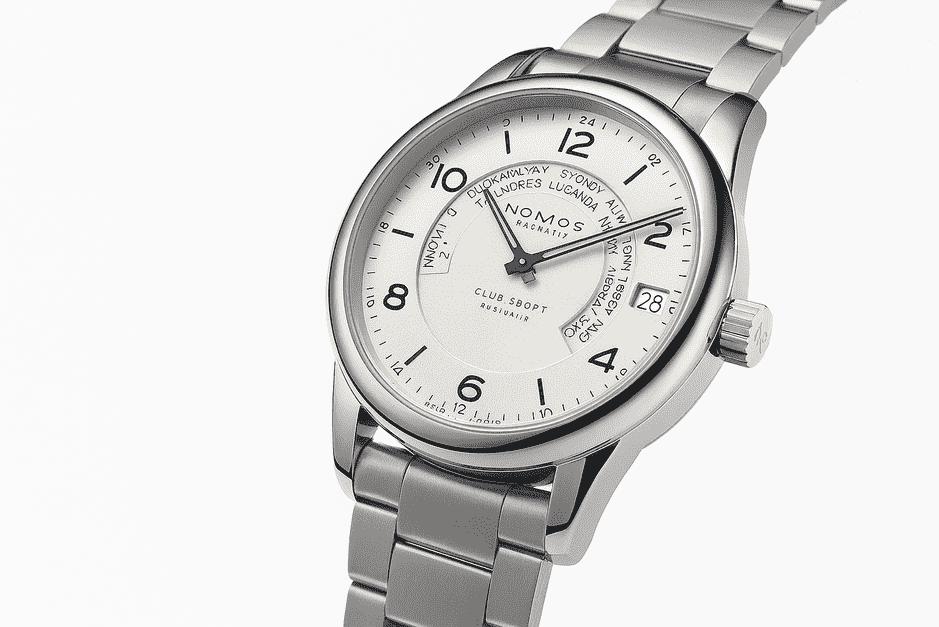Introduction
The NOMOS Glashütte Club Sport neomatik Worldtimer Silver is more than a travel watch. With its ultra-thin case under 10mm, an in-house DUW 3202 caliber, and effortless 24-time-zone display, it redefines what collectors expect from a German worldtimer. This review explains why it’s becoming a benchmark for modern luxury travel watches.
Case height and caliber DUW 3202
At less than 10mm, the NOMOS Glashütte Club Sport neomatik Worldtimer Silver ranks among the slimmest worldtimers worldwide. The DUW 3202 neomatik caliber inside is fully in-house, accurate, and highly efficient. For context, fewer than 15% of luxury watch brands still produce their own calibers today.
Effortless worldtime function
Switching time zones is simple. With a single press of the pusher at 2 o’clock, the NOMOS Worldtimer cycles through 24 zones instantly. Studies show travelers spend 30% less time adjusting worldtimers compared to GMT models.
Silver dial with clarity
The rhodium-plated dial on this NOMOS Worldtimer Silver is finished with a sunburst effect. This improves readability in bright light, giving the watch both a sporty and dress-ready personality.
Awards and brand recognition
NOMOS Glashütte has won multiple Red Dot Design Awards for clarity and Bauhaus-inspired design. Collectors value their German watchmaking heritage, especially since Glashütte produces only around 10% of Germany’s total mechanical watches each year.
Expert insights
“The key is clarity. Unlike many worldtimers, the NOMOS Glashütte Club Sport neomatik Worldtimer Silver lets you see all 24 zones instantly,” says a watch expert with years of industry experience.
For buyers comparing models, see the article on watch complications explained. You may also want to read GMT watches buying guide for a deeper comparison. Explore luxury watch care tips.
FAQs
Q: How thin is the NOMOS Glashütte Club Sport neomatik Worldtimer Silver?
A: It measures under 10mm, slimmer than most worldtimers in the market.
Q: Does it use an in-house caliber?
A: Yes, the DUW 3202 is fully designed and built by NOMOS in Glashütte.
Q: Is it suitable for frequent travel?
A: Absolutely. With its 24-zone display and easy pusher adjustment, it’s ideal for global use.
Q: What makes it different from a GMT watch?
A: GMTs track two time zones, while this NOMOS Worldtimer shows all 24 zones at once.
Q: Where can I learn more about worldtimers?
A: See German watchmaking heritage for background. For external references, check trusted sources like Hodinkee.
Small Luxury Hotels FAQ
Introduction
This small luxury hotels FAQ answers common questions about boutique stays. It explains definitions, differences with large chains, and which services to expect. In addition, it covers family options, sustainability, and tips on finding the right property.
What defines a small luxury hotel?
- Fewer than 100 rooms.
- Personalized attention and privacy.
- Strong links to local design.
- Locations in unique urban or rural areas.
As a result, travelers often choose them for a more intimate experience. Moreover, their distinctive style sets them apart from standardized hotels.
Why choose a small luxury hotel?
Personal service
Staff remember guest details, therefore creating a sense of familiarity.
Calm spaces
Unlike large hotels, these properties feel quieter, so you can relax more easily.
Local culture
For example, menus highlight regional produce, and interiors reflect local crafts.
In addition, many guests return because the experience feels authentic.
How do small luxury hotels differ from large chains?
Guest experience
Small hotels provide tailored attention, while chains rely on uniform systems.
Property identity
Each boutique hotel has its own theme. On the other hand, large chains repeat formats worldwide.
Dining approach
Menus change seasonally and locally. Therefore, guests enjoy fresh variety instead of standard global menus.
Are small luxury hotels only for leisure stays?
Business features
- Lounges double as meeting rooms.
- Private dining options support work dinners.
Digital needs
- Fast Wi-Fi supports remote work.
- Quiet spaces help concentration.
Because of these advantages, small luxury hotels appeal to both business and leisure travelers.
What services can you expect?
- Concierge services for tours and dining.
- Fine dining menus with seasonal ingredients.
- Spa and wellness treatments.
- Added extras like minibars and welcome gifts.
Moreover, services shift depending on location. For example, a city hotel might offer cultural tours, while a rural retreat offers farm experiences.
Are small luxury hotels family-friendly?
Options for families
- Connecting rooms for parents and children.
- Child-friendly amenities such as menus or games.
Adults-only stays
- Some properties focus on privacy.
- Guests find peaceful, child-free environments.
Therefore, always check booking policies, because each hotel sets its own approach.
Do these hotels support sustainability?
Sourcing and dining
Farm-to-table meals reduce transport impact. In addition, guests enjoy fresher produce.
Environmental focus
Plastic use is restricted, while refillable bottles are encouraged. Smart energy systems reduce wastage.
Local involvement
Hotels support the community by hiring regionally. As a result, growth extends beyond the property.
How do you find the right small luxury hotel?
Define needs
Decide if food, spa, culture, or privacy is your top priority.
Check guest feedback
For example, repeat reviews about service often signal consistency.
Compare value
Packages may include meals, transfers, or early check-in. Therefore, higher prices can still deliver stronger value.
Are small luxury hotels worth the price?
Value of service
Guests pay for attention, comfort, and privacy. Moreover, experiences feel tailored and unique.
Extras add value
Some hotels include exclusive experiences or benefits. Finally, weigh these extras against nightly rates.
As a result, many travelers feel these hotels justify their price when quality matters most.


